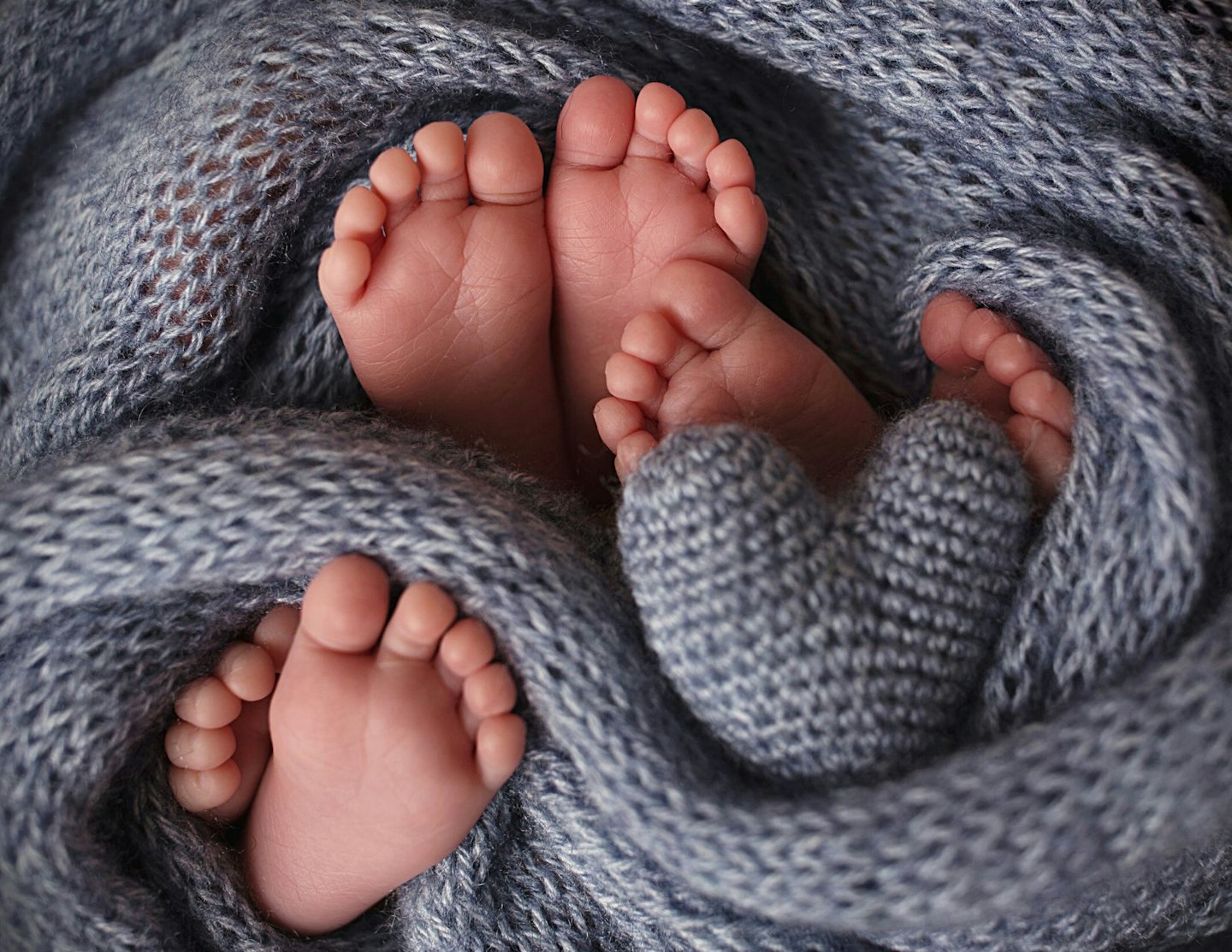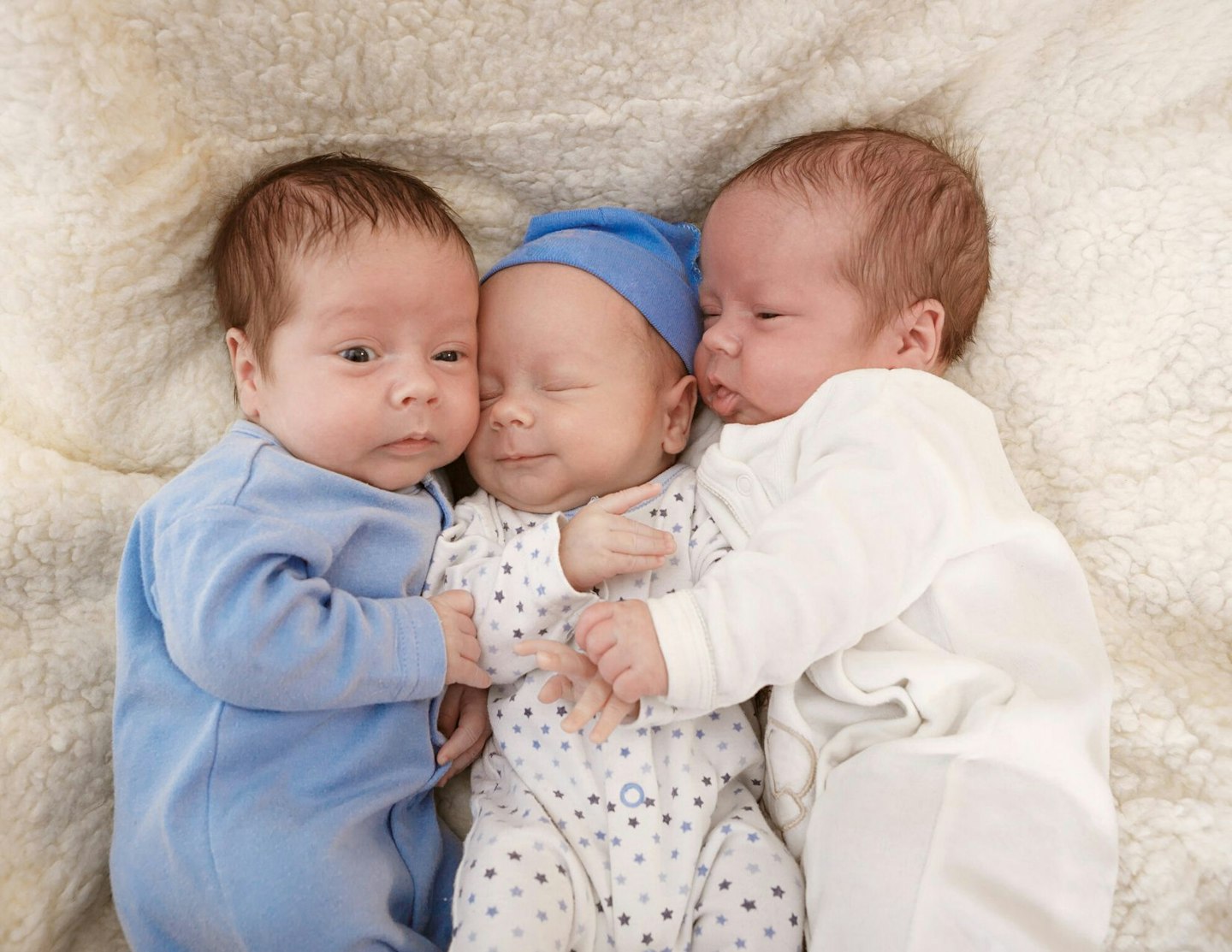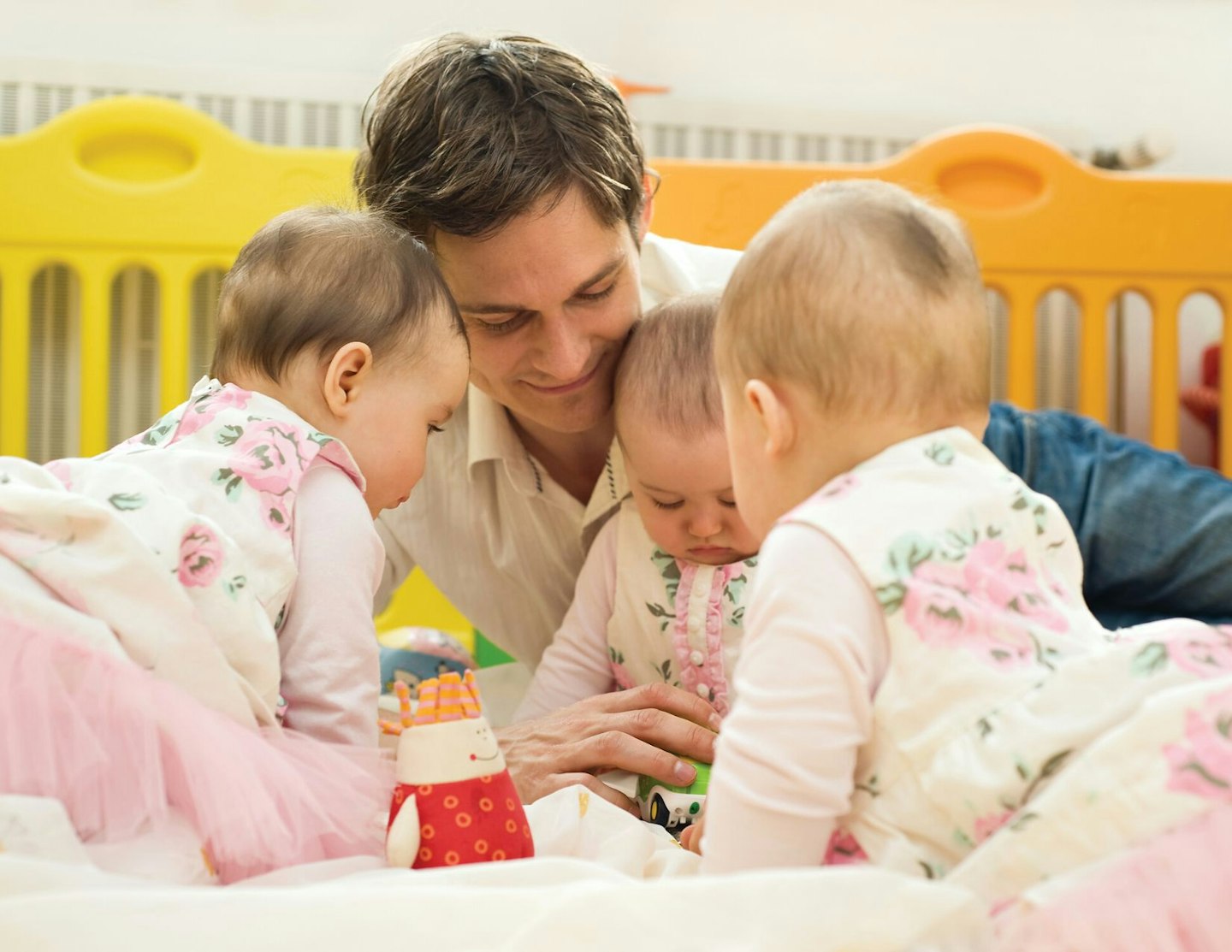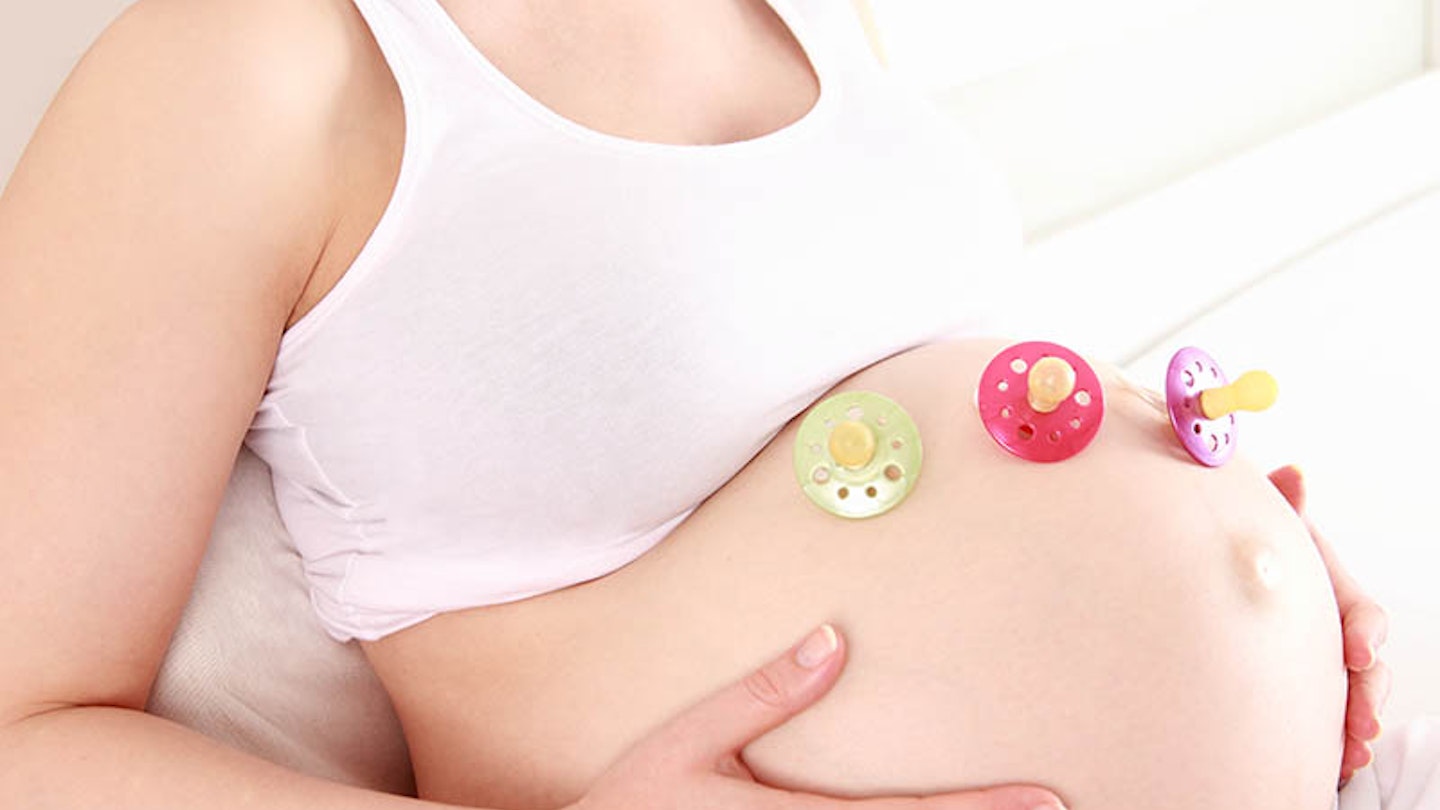The positive pregnancy test left you spinning with excitement, but the scan that showed you were carrying three babies probably left you spinning in a very different way. You’re expecting triplets! And whether you're beyond excited, scared out of your mind, or a bit of both - all your feelings are valid, and there are plenty of ways to prepare yourself.
While having triplets means three times the cuteness, you may also be thinking of three times the stretchmarks and three times the labour effort. And let’s not go near the prospect of night feeds... Add in the strong possibility that you don’t know anyone else who’s had triplets (and, no, Phoebe of Friends fame doesn’t count) – you may be in the middle of a never-bargained-for-this meltdown.
But the human body is amazing and it’ll surprise you with how it adjusts – and expands – to house your little ones. We've asked experts at the Twins Trust. about what to expect when you're expecting triplets.

Getting to grips with triplets
Around 200 sets of triplets are born in the UK each year, so rest assured that lots of women have been through a triple pregnancy before and had three beautiful and healthy babies.
Your babies are most likely to be non-identical (three separate eggs fertilised by three sperms at the same time), as identical triplets, from one egg split into three, are very rare. If you can’t tell by looks alone, once your babies are here, you can find out with a DNA test on your placenta.
What causes triplet pregnancies?
As mentioned previously, non-identical triplets come from three separate eggs being fertilised by three different sperms, but identical triplets come from one fertilised egg splitting into three.
Multiple eggs can be released from regular menstruation in rare cases but this can also occur when going through the IVF process, where having multiples is more common. It will depend on the individual person.
A hereditary trait can be passed down a maternal family line which can make a pregnancy with multiples more likely, plus you have a higher chance of having a multiple pregnancy if you are a multiple yourself.

What to expect during your pregnancy
Being pregnant with triplets is classed as a high-risk pregnancy. However, you’ll be assigned to a consultant obstetrician who will monitor you very closely throughout your pregnancy so you’ll be in safe hands at all times.
"Try to take it easy – you’ll probably find you tire quickly and need to stop work sooner than if you were carrying one baby," says Sandra Bosman, midwifery consultant for Twins trust. "High blood pressure, diabetes and premature labour are all possibilities, but taking care of yourself will help prevent this developing."
And, as you might expect, you’ll look like you’re expecting triplets.
Sharon Farmiglietti, multiple birth expert says: "Pelvic pain is unfortunately quite common and occurs because the pelvis needs to be more flexible for birth but sometimes it can relax too much and become unstable. Ask your midwife to refer you to a physiotherapist who should be able to help."
"Morning sickness is more common with multiples because of the additional pressure on the body but you should see a medical professional if you are unable to hold down fluids or food."
When your due date approaches, if one or more of your babies doesn’t seem to be thriving, your doctor may induce labour.
What will a triplet pregnancy be like for you?
Of course you're excited to meet your babies, but it's okay to think about yourself too. When you look after yourself during your pregnancy, you'll be looking after them too, so it is incredibly important.
As with all pregnancy-related subjects, how you look after yourself will come down to you individually so, speak to your doctor or midwife to make sure that you're doing what's right for you and your body.
Nutrition - Similar to any other pregnancy, making sure you eat a well-rounded diet, with three meals a day and a couple of snacks is important. As you're carrying three, you'll need to up your calories per day so you and your little ones can grow healthily. In the first trimester, add 300 calories to your daily diet per baby. For the second trimester, up it to 340 calories per baby and for the third, 452 calories per baby.
Exercise - The pregnant body is incredible, so yes, you can exercise during pregnancy. We would recommend lighter, non-weight-bearing, exercises, especially as the pregnancy develops. Yoga and swimming as some of the best for your mental and physical health during a triplet pregnancy.
Bed Rest - Because of the risks, someone who is pregnant with triplets may need to go on bed rest earlier than common. You could be asked by your doctor to start bed rest as early as 24 weeks with regular check-ups. Just remember that this is all for the wellbeing of you and your babies.
The risks of a triplet pregnancy
Thinking about the risks in any pregnancy can be overwhelming, and worrying is natural, but the better prepared you are, the more you'll be ready to tackle whatever comes your way. You've got this!
One of the most common risks that come with being pregnant with multiples is preterm labour. Most higher-order multiples are born premature (before the 37 week mark), but your midwives and doctors will be able to prepare for that. Premature babies have a higher chance of thriving than ever before so, preterm birth isn't as scary as it sounds. Your babies may need to spend some time in the neonatal intensive care unit (NICU) but again, your midwives and paediatricians can guide you through that.
There is also a risk of a miscarriage of either one or more of the foetuses throughout each trimester, which is why a pregnancy with multiples will require more monitoring and check-ups to check how the pregnancy is developing.
When multiples are born, there is also more of a risk that they may have a congenital (present at birth) birth defect. But again, your doctors will be prepared for this and will help you to navigate those scenarios.
For the mother, there is also a higher risk of gestational hypertension, anaemia, and postpartum haemorrhaging. Again, this can all seem incredibly scary, but we'd recommend listening to your body and letting your doctor assist you as much as possible. These are all just possibilities, not definites.
What to expect during labour
Most triplets are delivered at around 34 weeks, so it’s sensible to get your hospital bags (yep, plural, or mahoosive, in this case) packed a few weeks before this so you’re ready when you’re babies are.
"You’ll probably have to stay in hospital for longer than usual," Sandra explains. "And it also means you have over a 50% chance of having a caesarean. Your first baby may be born vaginally but if the others get distressed then you might need a c-section."
"You are also more likely to be encouraged to have an epidural during labour if you are having multiples but it is entirely up to you," adds Sharon. "The reasons they may encourage you to have one is so that it is already in place in case you need a c-section but some units will set up the epidural but not administer the drugs unless required."
"The other reason is that if they need to turn the second baby it can be painful. Induction can lead to more intervention later on, so it is normally only done if there are medical grounds to do so. However, the type of pain relief you have is your choice – the midwives have a duty of care to you, whatever you decide."
When having multiples, you’ll have your labour monitored more carefully and there will be more medical professionals present than for a singleton birth.
The length of labour will be similar to that of a singleton as the first part of labour when the cervix dilates and the opening is made for your babies to arrive is the same for one baby as for two or three.
Your triplets will probably be born very small and may have some trouble breathing. If this is the case, they’ll need to stay in an intensive care unit until they are strong enough to look after themselves.
What to expect when the triplets arrive
Being a mum to three babies will be extremely time-consuming and exhausting – so, rest whenever you can. ‘A routine and good organisation skills are essential,’ advises Sandra. ‘Prioritise things that are essential.’
Try to feed your babies at the same time so that they start to synchronise – even if that means waking one or two of them up. If you would like to breastfeed (pumping and bottle feeding are options too), you can – your breasts will respond to the feeding and keep producing milk until all three of your little ones are full.
"You will be reassured to know that a sleep study of twins showed that twins who sleep together are no more likely to wake each other than those that sleep separately," says Sharon. "So don't be concerned that your triplets will be waking each other up when they cry."
"Having twins can be more tiring so accept any offers of help you get. If you feed them at the same time they are more likely to sleep at the same time."

Support available for you
Look for multiple and triplet groups in your area, to swap stories with and vent to other parents about things that only a mum of multiples understands. Twins Trust is a fantastic online resource which you can use to chat with experts and receive advice.
Having triplets will probably be the most trying and tiresome thing you’ve ever done – or will ever do – in your life.
But the rewards are endless and very few people can say that they have triplets. It’s definitely a unique parenting experience.
About the expert
Sharon Darke has a diploma in antenatal education and holds a current NCT Licence to practice. She runs multiple birth courses for Twins Trust. providing couples with the information and confidence to face the journey ahead, and is responsible for training all teachers and ensuring the quality of provision.
As well as running antenatal courses for both singletons and multiples, Sharon trains childcare students to work in nurseries and has two kids of her own.
Eve Miller is a Commercial Content Writer for Mother&Baby, working for Bauer Media for over two years. She is passionate about beauty, creative writing, and women’s healthcare.
